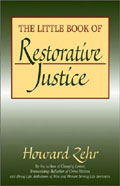 The Little Book of Restorative Justice by Howard ZehrIf you want to read more about restorative practices, there are quite a number of books and articles that do a great job explaining the basic concepts. In fact they’re so good we use them in our courses in our Graduate School. They include the following:
The Little Book of Restorative Justice by Howard ZehrIf you want to read more about restorative practices, there are quite a number of books and articles that do a great job explaining the basic concepts. In fact they’re so good we use them in our courses in our Graduate School. They include the following:
Nils Christie’s brilliant and seminal article, "Conflicts as Property," introduces the amazing idea that individuals involved in a conflict "own" that conflict. Currently this ownership is almost always usurped from them when they enter the legal system. (Restorative justice and restorative practices attempt to return conflict to its rightful owners.)
A second article, "Fair Process: Managing in a Knowledge Economy," from the Harvard Business Review describes how the principles of engagement, explanation, and expectation clarity can be used to produce better outcomes. Even though it’s written for the corporate world, those principles mesh perfectly with restorative practices.
Restorative Justice in Civil Society includes an article by our own Ted Wachtel and Paul McCold, which extends the idea of restorative justice beyond crime, delinquency and bullying to show how restorative practices like circles and conferences can “enhance the civility of society” overall.
We also use two terrific books that might be of interest depending on your focus:
For a great primer for educators, take a look at The Restorative Practices Handbook for Teachers, Disciplinarians and Administrators which explains in detail how restorative practices can be used daily in classrooms and schools to proactively build positive school communities while dramatically reducing discipline referrals, suspensions and expulsions. The book covers some basic theory and fundamental concepts, but is full of examples of how to apply restorative practices throughout a school setting.
The Little Book of Restorative Justice by Howard Zehr looks more broadly at the principles and practices needed to make restorative justice a reality. This book, as its title suggests, and the RP Handbook are both short, accessible reads, and they are available in our bookstore.
Below are the details to you need to find all the above resources:
Christie, N. (1977). Conflicts as property. The British Journal of Criminology, 17(1), 1-14.
Costello, B., Wachtel, J. & Wachtel, T. (2009). The restorative practices handbook for teachers, disciplinarians and administrators. Bethlehem, PA: International Institute for Restorative Practices.
Kim, W. C. & Mauborgne, R. A. (1997). Fair process: Managing in the knowledge economy. Harvard Business Review, July/August, 66-75.
Wachtel, T. & McCold, P. (2000). Restorative justice in everyday life. In J. Braithwaite & H. Strang (Eds.), Restorative justice in civil society (pp. 117-125). New York: Cambridge University Press.
Zehr, H. (2002). The little book of restorative justice. Intercourse, PA: Good Books.
